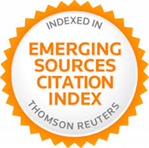El apocalipsis como simulacro postraumático en "Cenital" de Emilio Bueso
DOI:
https://doi.org/10.37536/preh.2013.1.2.1014Palabras clave:
Post-apocalipsis, simulacro, trauma, repetición, fin, Emilio Bueso, CenitalResumen
El objetivo del presente artículo es responder una pregunta: ¿es posible una narración social original tras el fin de la era postmoderna? En consonancia con los diversos “finales” –históricos, meta-narrativos, etc.- de las teorías posestructuralistas, este trabajo tiene por finalidad explorar el apocalipsis secular como estrategia discursiva y narrativa para hablar de la imposibilidad de generar nuevas construcciones sociales ficticias tras el advenimiento de la catástrofe. Todo el análisis estará centrado sobre la novela del español Emilio Bueso, Cenital (2012). En momentos profundamente post-apocalíptica, a veces completamente distópica, Cenital es siempre reflexiva en torno a su constitución como producto cultural en la era del capitalismo tardío. La narración de Cenital pone en evidencia las carencias, contradicciones y temores de la sociedad postmoderna frente a la idea del fin y es justamente gracias a estas falencias que permite la irrupción de la incertidumbre que caracteriza la hipótesis de este estudio.
Citas
Baccolini, Rafaela y Moylan, Tom (ed.) (2003): Dark Horizons. Science Fiction and the Dystopian Imagination. Nueva York, Taylor & Francis Group.
Baudrillard, Jean (1989): “Simulacra and Simulations”. Trad. de Paul Foss, Paul Patton y Phillip Beitchman. En: Poster, Mark (ed.): Selected Writings. Oxford, Blackwell/Polity, pp. 166-184.
Baudrillard, Jean (1989b): “The Anorexic Ruins”. En Kamper, Dietmar y Wulf, Christoph (eds.): Looking Back on the End of the World. Trad. de David Antal. Nueva York, Semiotext(e), pp. 29-45.
Berger, James (1999): After the End. Representations of Post-Apocalypse. Minneapolis, University of Minnesota Press.
Bueso, Emilio (2012): Cenital. Madrid, Salto de Página.
Dieterle, Eric (2002): “Wasteland or Sanctuary? Post-Apocalyptic Life in a Nuclear Landscape”. En: Interdisciplinary Studies in Literature Environment, vol. 9, n.º 2, pp. 763-786.
Domingo, Andreu (2008): Descenso literario a los infiernos demográficos. Barcelona, Anagrama.
Edwards, Caroline (2009): “Microtopias: the Post-Apocalyptic Communities of Jim Grace’s The Pesthouse”. En: Textual Practice, vol. 23, n.º 5, pp. 763-786.
Foucault, Michel (1976): Vigilar y castigar. Buenos Aires, Siglo XXI.
Foucault, Michel (2008): Seguridad, Territorio, Población. Trad. de Horacio Pons. Madrid, Akal.
Heffernan, Theresa (2008): Post-Apocalyptic Culture. Modernism, Postmodernism and the Twentieth-Century Novel. Toronto, University of Toronto Press Incorporated.
Heuser, Sabine (2003): Virtual Geographies: Cyberpunk at the Intersection of the Postmodern and Science Fiction. Nueva York, Rodopi.
Jameson, Frederic (1994): The Seeds of Time. Nueva York, Columbia University Press.
Jameson, Frederic (2005): Archeologies of the Future. The Desire Called Utopia and Other Science Fictions. Londres, Verso.
Levitas, Ruth (1990): The Concept of Utopia. Nueva York, Syracusse University Press.
Manjikian, Mary (2012): Apocalypse and Post-Politics. The Romance of the End. Plymouth, Lexington Books.
Moreno, Fernando Ángel (2010): Teoría de la Literatura de Ciencia Ficción: Poética y retórica de lo prospectivo. Vitoria, Portal Editions.
Moylan, Tom (2000): Scraps of the Untainted Sky. Colorado: Westview Press.
Pordzik, Ralph (ed.) (2009): Futurescapes. Space in Utopian and Science Fiction Discourses. Nueva York, Rodopi.
Sargent, Lyman Tower (1975): “Utopia – The problema of Definition”. En: Extrapolation vol. 16, n.º 2, pp. 137-148.
Sargent, Lyman Tower (1994): “The Three Faces of Utopianism Revisited”. En: Utopian Studies, vol. 5, n.° 1, pp. 1-38.
Schlobin, Roger C. (2004): “Dark Shadows and Bright Lights: Generators and Maintainers of Utopias and Dystopias”. En Batter, Martha (ed.): The Utopian Fantastic. Selected Essays from the Twentieth International Conference on the Fantastic in the Arts. Westport, Praeger Publishers, pp. 11-16.
Suvin, Darko (1973): “Defining the Literary Genre of Utopia: Some Historical Semantics, Some Genology, a Proposal, and a Plea”. En: Studies of the Literary Imagination, n.º 2, pp. 121-145.
Descargas
Publicado
Cómo citar
Número
Sección
Licencia
Derechos de autor 2013 Gabriel Saldías Rossel

Esta obra está bajo una licencia internacional Creative Commons Atribución 4.0.








